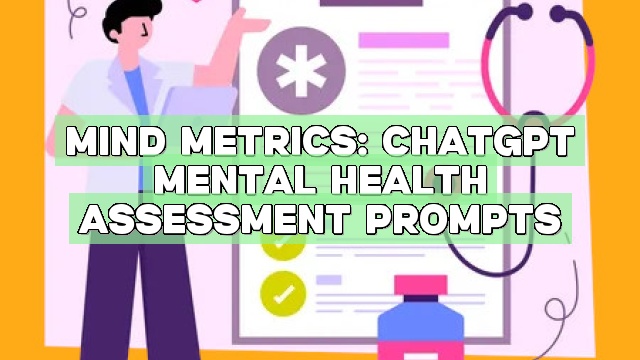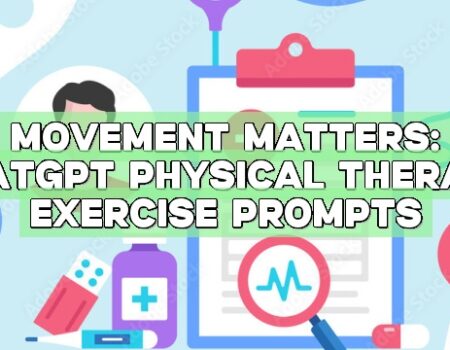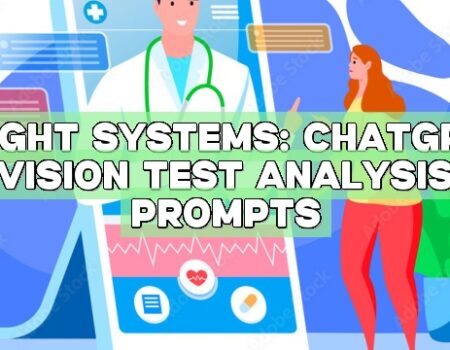ChatGPT, developed by OpenAI, is an AI chatbot that utilizes natural language processing to generate human-like conversations, making it a valuable tool for mental health assessments. While it has limitations, such as potentially outdated output, it still has potential as a prompt generator for mental health assessments.
With precision mental health as a promising approach, ChatGPT can generate valuable insights, recommendations, and content, saving time and increasing efficiency for healthcare professionals while providing better patient care. Crafting effective prompts for the chatbot is essential to generate meaningful responses.
Key Takeaways:
- ChatGPT is an AI chatbot utilized for mental health assessments.
- Precision mental health combines science, technology, and data analysis to provide personalized care.
- Crafting effective prompts is essential for generating valuable insights and recommendations.
The Limitations of ChatGPT
While ChatGPT has been trained on massive amounts of data, including conversations and text-based content, it does have certain limitations that need to be considered. As an AI chatbot, ChatGPT relies on its training data to generate responses. Therefore, the quality of output depends on the quality of data used for training. Additionally, ChatGPT may generate outdated output as it has only been trained up until 2021.
These limitations can impact the accuracy and relevance of responses generated by ChatGPT, which is why alternative options like Chatsonic are gaining popularity. By addressing the need for up-to-date AI-generated content, Chatsonic is quickly becoming a preferred option for businesses and industries that require timely and accurate responses.
Introducing Chatsonic: An Alternative to ChatGPT
To address the need for up-to-date AI-generated content, Writesonic has developed Chatsonic, an alternative to ChatGPT that offers advanced features and integration with precision mental health. Chatsonic is an AI-powered chatbot that utilizes natural language processing to generate human-like conversations and provide relevant responses. It is integrated with Google Search, providing the latest and trendy data on current events to ensure that its AI-generated content remains fresh and up-to-date.
In addition to its search integration, Chatsonic includes features like AI art generation through integration with Dall-E and Stable Diffusion, as well as the ability to understand voice commands and respond like Siri or Google Assistant. Developers can integrate Chatsonic capabilities into their own apps using the Chatsonic API. Additionally, there is a Chatsonic Chrome extension and mobile app available for convenient usage.
When it comes to mental health assessments, precision mental health is a promising approach that combines science, technology, and data analysis to deliver personalized care tailored to each person’s unique genetic, environmental, and experiential factors. Precision mental health aims to revolutionize the way mental health conditions are diagnosed, treated, and managed by understanding the distinct biological, psychological, and social factors that underlie these disorders.
Chatsonic’s integration with precision mental health makes it an ideal partner for healthcare professionals looking to enhance their patients’ mental health assessments. Its AI-generated content and advanced features can provide personalized recommendations and insights to patients, saving healthcare professionals time and improving patient outcomes. By leveraging the power of science, technology, and personalized care, Chatsonic can potentially transform the way mental health conditions are diagnosed and managed, improving patient outcomes and overall mental health care.
Overall, Chatsonic’s advanced features and integration with precision mental health make it a prime candidate for healthcare professionals looking to enhance their mental health assessments. Its AI-generated content can provide valuable insights and recommendations while saving healthcare professionals time, making it an ideal tool for delivering better patient care.
Precision Mental Health: A Promising Approach
Precision mental health combines science, technology, and data analysis to deliver personalized care and revolutionize the way mental health conditions are diagnosed, treated, and managed. This approach aims to identify the unique genetic, environmental, and experiential factors that contribute to mental health conditions, enabling healthcare professionals to provide tailored and effective treatment plans.
Healthcare professionals can leverage the power of AI chatbots like ChatGPT in conjunction with precision mental health to enhance mental health assessments, diagnosis, treatment, and overall patient care. AI chatbots provide valuable insights, recommendations, and content while saving time and increasing efficiency.
AI-powered chatbots like ChatGPT or Chatsonic have a significant role to play in mental health assessments and can provide a wide range of prompts. These prompts guide the AI chatbot in generating valuable content, including explaining medical conditions and treatments, addressing patient concerns and questions, creating empathetic and supportive messages, writing case summaries and patient histories, drafting progress notes and treatment plans, summarizing research articles and clinical trials, and generating ideas for research topics.
The integration of AI-powered chatbots and precision mental health has the potential to revolutionize the healthcare industry, enabling healthcare professionals to provide personalized care and better patient outcomes. Crafting clear and concise prompts is essential to ensure that AI chatbots generate meaningful responses. Specificity, open-ended questions, simplicity, and providing context are elements to consider while creating prompts.
However, it is crucial to note that entering personally identifiable information (PII) or protected health information (PHI) into AI chatbots may pose potential privacy breaches and violate regulations like HIPAA (Health Insurance Portability and Accountability Act). Healthcare professionals must be careful while using AI chatbots and refrain from including PHI in any prompts submitted to AI chatbots to maintain patient confidentiality.
Precision mental health holds significant potential in transforming the lives of individuals and families affected by mental health conditions. By leveraging the power of science, technology, and personalized care, precision mental health can provide effective and tailored mental health support. The future of mental healthcare lies in the integration of precision medicine into clinical practice, enabling widespread access to personalized mental health interventions.
The Role of ChatGPT in Mental Health Assessments
In the realm of mental health, ChatGPT can provide valuable prompts for mental health assessments, guiding the AI chatbot in generating insights and recommendations. These prompts can include a range of topics, from medical conditions and treatments to patient concerns and research topics.
Using ChatGPT for mental health assessments can save time and effort for healthcare professionals while providing better patient care. The chatbot can generate empathetic and supportive messages, write case summaries and patient histories, and draft progress notes and treatment plans. ChatGPT can also summarize research articles and clinical trials, providing relevant information to healthcare professionals who need it.
However, crafting effective prompts is crucial for generating meaningful responses. Specificity, open-ended questions, simplicity, and providing context are essential elements to consider while crafting prompts. These elements ensure that the chatbot generates relevant and accurate responses.
It’s important to note that entering personally identifiable information (PII) or protected health information (PHI) into ChatGPT may pose potential privacy breaches and violate regulations like HIPAA (Health Insurance Portability and Accountability Act). It is recommended to refrain from including PHI in any prompts submitted to AI chatbots to maintain patient confidentiality. It is advisable to verify the compliance of third-party chatbot providers with HIPAA or similar data protection regulations before engaging with them.
In summary, ChatGPT plays a significant role in mental health assessments by providing prompts for AI chatbots. Crafting clear and concise prompts can lead to more meaningful responses, saving time and increasing efficiency for healthcare professionals while providing better patient care.
Crafting Effective Prompts for ChatGPT
Crafting effective prompts is essential to maximize the value of ChatGPT in mental health assessments and ensure better patient care. AI-powered chatbots like ChatGPT have the ability to generate meaningful insights and recommendations for healthcare professionals, but the quality of the output depends on the quality of the input prompts. Therefore, it is crucial to consider specific elements while crafting prompts to generate accurate and useful responses.
One of the key elements to consider is specificity. The prompts must be as specific as possible to provide relevant and accurate responses. Open-ended questions can help facilitate this, allowing patients to provide more detailed answers and enabling the AI chatbot to generate more meaningful insights.
Another critical factor is simplicity. The prompts should be simple and clear to understand, avoiding long and complicated sentences or technical jargon. Patients may feel overwhelmed or intimidated by complex language, leading to incomplete or inaccurate responses and potentially leading to misdiagnosis or improper treatment.
Providing context is also essential to crafting effective prompts for ChatGPT. Patients’ mental health conditions and histories can vary widely, so it is important to provide context to ensure the AI chatbot can generate accurate and personalized responses. Including relevant details such as symptoms, medications, family history, and previous treatments can help provide a comprehensive picture of the patient’s mental health status.
Healthcare professionals have the unique opportunity to craft prompts that provide empathetic and supportive messages, creating a safe and non-judgmental space for patients to discuss their mental health conditions. Writing prompts that show empathy, encourage openness, and provide reassurance can help patients feel more comfortable and willing to disclose sensitive information, leading to better mental health assessments and treatment plans.
Overall, crafting effective prompts is a crucial step in maximizing the value of ChatGPT in mental health assessments. Healthcare professionals should ensure the prompts are specific, simple, and provide relevant context while also incorporating empathetic and supportive messaging. By doing so, they can generate meaningful insights and recommendations that can ultimately lead to better patient care.
Privacy Considerations for ChatGPT
It is crucial to be mindful of privacy considerations when using ChatGPT and avoid entering personally identifiable or protected health information. Although AI chatbots like ChatGPT and Chatsonic can enhance mental health assessments, they may pose potential privacy breaches when interacting with patients due to the collection of sensitive data.
Protected health information (PHI) such as medical records, diagnoses, treatments, and payment information is bound by strict guidelines of the Health Insurance Portability and Accountability Act (HIPAA) in the USA and similar data protection regulations worldwide. Breaching HIPAA regulations may lead to legal consequences, including hefty fines and the loss of patient trust.
To avoid this, it is best to refrain from entering any PII or PHI into ChatGPT or any other AI chatbot. Furthermore, healthcare professionals are advised to verify the compliance of third-party chatbot providers with HIPAA or similar data protection regulations before engaging with them. This ensures that any data shared with them is secure and confidential.
The Future: Precision Medicine and Personalized Mental Health
The integration of precision medicine into clinical practice holds the key to providing personalized mental health support and improving outcomes. Precision mental health combines the latest advancements in genetics, neuroscience, and data analysis to understand the biological, psychological, and social factors that contribute to mental health disorders. By leveraging this information, healthcare professionals can tailor treatment plans to meet the specific needs of each patient.
The future of mental healthcare lies in the integration of precision medicine into clinical practice, enabling widespread access to personalized mental health interventions. This approach has the potential to transform the lives of individuals and families affected by mental health conditions. Precision mental health can provide effective and tailored mental health support in a variety of areas, including prevention, diagnosis, treatment, and management of mental health disorders.
Conclusion: Enhancing Mental Health Assessments with ChatGPT
Utilizing AI chatbots like ChatGPT in conjunction with precision mental health offers a compelling opportunity to enhance mental health assessments and improve patient care. ChatGPT can play a significant role in mental health assessments by providing prompts that generate valuable insights, recommendations, and content, saving time and increasing efficiency for healthcare professionals while providing better patient care.
While ChatGPT has certain limitations, such as being trained up till 2021, Chatsonic provides an alternative solution integrated with Google Search, Dall-E, and Stable Diffusion, offering up-to-date and sophisticated AI-generated content. Developers can integrate Chatsonic capabilities into their own apps via the Chatsonic API. Specificity, open-ended questions, simplicity, and providing context are key elements to consider while crafting prompts.
It is important to note, however, that entering PII or PHI into ChatGPT may result in potential privacy breaches and violate regulations like HIPAA. It is recommended to avoid including PHI in any prompts submitted to AI chatbots to maintain patient confidentiality and verify the compliance of third-party chatbot providers with HIPAA or similar data protection regulations before engaging with them.
Precision mental health offers hope in revolutionizing the way mental health conditions are diagnosed, treated, and managed by tailoring personalized care to each person’s unique biological, psychological, and social factors. The integration of AI-powered chatbots and precision mental health can transform the healthcare industry, enabling healthcare professionals to provide better patient outcomes and democratize access to personalized mental health interventions.
In summary, the future of mental healthcare lies in leveraging precision medicine to deliver personalized mental health support, with ChatGPT and Chatsonic playing a significant role in enhancing mental health assessments, diagnosis, treatment, and overall patient care.
FAQ
Q: What is ChatGPT and its role in mental health assessments?
A: ChatGPT is an AI chatbot developed by OpenAI. It plays a significant role in mental health assessments by providing prompts for generating valuable insights, recommendations, and content, saving time and increasing efficiency for healthcare professionals while providing better patient care.
Q: What are the limitations of ChatGPT?
A: ChatGPT has limitations, such as being trained only up until 2021, potentially resulting in outdated output. It is crucial to consider these limitations while using ChatGPT for mental health assessments.
Q: What is Chatsonic and how does it compare to ChatGPT?
A: Chatsonic is an alternative to ChatGPT developed by Writesonic. It is integrated with Google Search, providing the latest and trendy data on current events. It also includes features like AI art generation, voice command understanding, and Siri/Google Assistant-like responses. Developers can integrate Chatsonic capabilities into their own apps using the Chatsonic API.
Q: What is precision mental health?
A: Precision mental health is an approach that combines science, technology, and data analysis to deliver personalized care tailored to each person’s unique genetic, environmental, and experiential factors. It aims to revolutionize the way mental health conditions are diagnosed, treated, and managed by understanding the distinct biological, psychological, and social factors underlying these disorders.
Q: How can ChatGPT enhance mental health assessments?
A: ChatGPT can enhance mental health assessments by providing prompts for various tasks such as explaining medical conditions and treatments, addressing patient concerns and questions, creating empathetic and supportive messages, drafting progress notes and treatment plans, summarizing research articles and clinical trials, and generating ideas for research topics.
Q: What should be considered while crafting prompts for ChatGPT?
A: When crafting prompts for ChatGPT, it is important to consider specificity, open-ended questions, simplicity, and providing context to generate meaningful responses in mental health assessments.
Q: What are the privacy considerations when using ChatGPT?
A: It is crucial to avoid entering personally identifiable information (PII) or protected health information (PHI) into ChatGPT to prevent potential privacy breaches and violations of regulations like HIPAA. It is advisable to verify the compliance of third-party chatbot providers with HIPAA or similar data protection regulations before engaging with them.
Q: What is the future of mental health care?
A: The future of mental health care lies in the integration of precision medicine into clinical practice, enabling widespread access to personalized mental health interventions that can transform the lives of individuals and families affected by mental health conditions.









